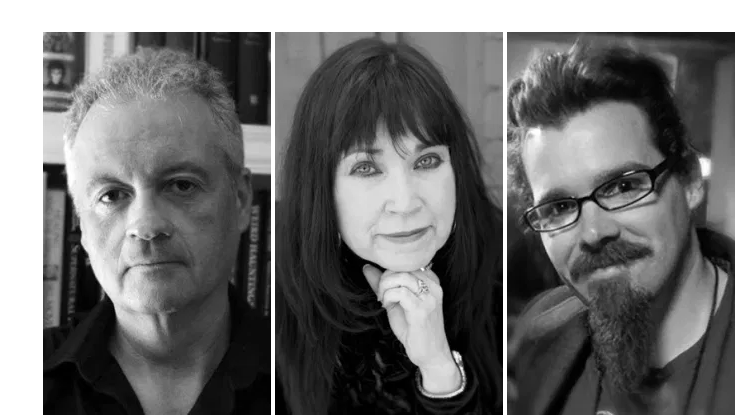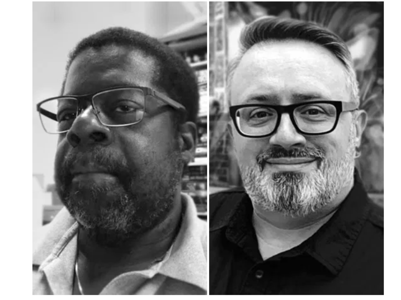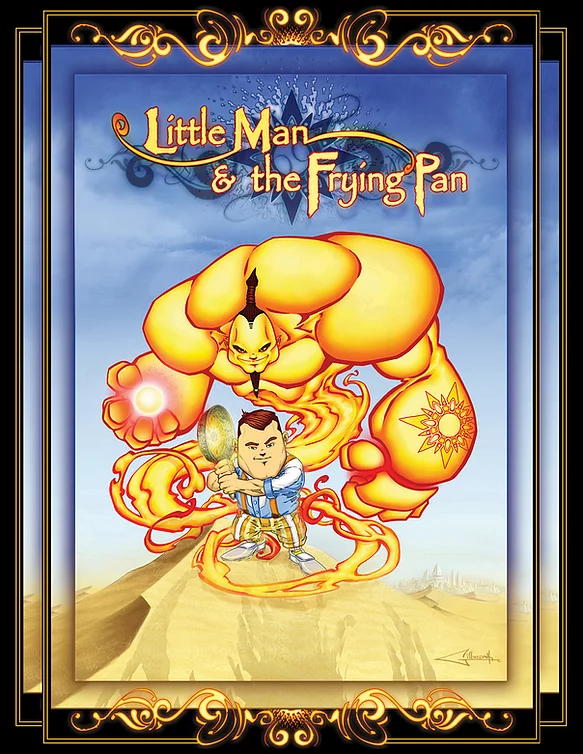A month ago Endpaper Entertainment was announced, a new content/IP company formed by publishing industry veterans Rich Johnson, Syndee Barwick, Kris Longo, James Killen and Jonathon Gilbreath. As part of our regular look behind the scenes of publishers, we sat down — well, actually fired up the Zoom — to talk with Johnson and Barwick about their goals and to get their insights into the current publishing climate.
In full disclosure: Johnson, Barwick and Longo were all part of the Beat team when we were part of Lion Forge, and Longo is currently the advertising director for The Beat. So with that revealed, we wanted to find out how you get new IP out there in the middle of a pandemic.
[This interview has been edited for clarity and length]
MacDonald: So tell us the origin of Endpaper.

Johnson: It actually started with a friend of mine coming to me wanting to be a producer for film and TV. And we tried for a while although we didn’t have funding to acquire anything. We actually came close to selling something to Nickelodeon. But certain life things happened and we put it on hold. But I started thinking, if we really want it to do this, how could we get properties without a lot of funding? I was very familiar with Alloy Entertainment for a variety of reasons. They worked with Little Brown when I was there to do Gossip Girl and The Clique. Even at Yen Press, we did Gossip Girl and Clique manga. I knew their business model was to create internally generated intellectual property with the idea of making it a book and then making it into film or TV. So I thought, well, I had a lot of ideas over the years. Let’s try to set up that kind of model. I think it could really work.
I think the big misconception that people have right now because four of us have backgrounds in comics, that this is all comics, which is not true. Our idea is that we want the right property, the right story for the right format. I think there are things better served maybe as a novel or better served as an audio book or a podcast or a comic. It really depends upon the content. I’ve seen a lot of books from some publishers over the years that are intended to be a pitch deck for Hollywood, and [they are usually] not that great and kind of obvious what they are. We’re really focused on getting good stories. We’re genre based, with material for kids and adults.
MacDonald: Syndee, what’s your interest in Endpaper? What drew you to it?
Barwick: When Rich was thinking about starting this with a couple of other people, I said to him, well, why don’t you just do it yourself? And, then he said, Hey, do you want to do this together? To Rich’s point, people do have the misconception that we’re a publisher or strictly working with talent for books, but that’s not the case. Our mission is to create stories with strong characters and target the best platform. We’re not strictly a book packager. We are a content studio and we’re IP development.
MacDonald: So, we hear that a lot those exact things, content studio and IP developer. What does that mean to a creator?
Johnson: Currently we’re not taking any outside properties; we’re keeping it internal. There might be a phase two or three where we’ll bring other stuff in to help people out and to do that. But for Endpaper, what that means is using our decades long experience, both in publishing and in media. We’ve worked for some of the biggest brands in the world, Batman and Superman. We worked for a film studio. I’ve consulted for Legendary. We know what the world is out there. Because of the nature of what all of us do, with comic cons, and books, trade shows, and the years we put into them — and the damage they’ve done to our knees! — I think something that most book publishers and packagers don’t do is get out there and look at the fans. Book Con was something that is fairly recent and that is now gone, unfortunately. Between you and I and Syndee and Jim and Kris, we’ve been collectively to probably hundreds of comic con and trade shows over the years. That’s where you really get to see how people react to the stories. That’s what drives us and why we understand that things can work on multiple levels. I really do believe that Superman was probably the first transmedia property ever.

MacDonald: It really was. I point this out all the time that within a few years of its debut, it was already being leveraged into serials, lunchboxes, everything. This was not the prehistoric times of media development – comics were totally being licensed out the yin yang even then
Johnson: Yeah. Animation and everything, the Fleischer shorts, which were spectacular. So [we have] knowledge and understanding of all that. For instance, there’s a property we have that’s based in the New York city subways. I wanted to set it back in the ’70s, around the summer of Sam, when New York was having its difficulties. It was kind of a scary place in certain areas. But period pieces are expensive and we’re in the middle of a pandemic. Could this be a film? Yes. It could be a film, but how do we start? How do we get the IP out first?

MacDonald: You launched with a large slate of properties, and they are all generated internally, just to be clear?
Barwick: We have a lot more than that really in different stages of development from the very top line idea to really, really developed ideas. It spans the gamut there. We must have a hundred. Wow!
MacDonald: Talk a little bit about the team. As you say, Rich, Syndee, you and I worked together at Lion Forge, and Kris too, And of course Jim Killen is a legend in both the comics and the science fiction industry. You four do have a very strong comics background. You have a fifth partner, Jonathon Gilbreath. What does everyone bring to the team?

Johnson: All of us are creators in some way. Syndee brings marketing expertise — look what she did at DC Direct. She built nothing from the ground up, a marketing idea into a multi-million dollar business for DC Comics. She understands the merchandise, marketing and sales. Jim is like you said, a legend. He was the guy who took, let’s face it, what were considered gutter categories, science fiction, fantasy, role-playing games, graphic novels, and helped make them respectable and legitimate. If it weren’t for Jim, creators like George RR Martin maybe wouldn’t have had the support he got — he was there at the forefront trying to get Barnes & Noble to pay more attention to this category.

MacDonald: Just to jump in there, when Jim was let go from B&N, of course there was an outcry in the comics community, but to be honest, I was not aware how loved he was in the science fiction community. He was recognized as such a trailblazer there too. And you’re absolutely right – he had a huge, huge part in getting that genre to be bestsellers as well. His farewell post on Facebook, the comments were like the all-stars of SF.
Johnson: Kris and I met – Kris thinks it may be the last time he ever shared a beer with somebody in a bar. It was at Toy Fair last year. I was trying to fill the needed buckets in my head for what you need to put this together. You need editorial, you need marketing, you need sales. Kris clearly is a great salesperson. Kris is an entrepreneur, and a smart guy and has connections like crazy. The idea was, could we bring a typical Hollywood kind of person into this? I’ve seen that kind of crash and burn at other places. So I met with Kris and said, you’ve never sold media rights have you? Do you want to try? He’s on the West Coast, quarantined like everybody else, but Kris is great at networking and business development and we’re lucky to have him.
Jon was a fluke.
Barwick: So much energy and creativity.
Johnson: We’re sitting in the last BEA that ever happened. And David Uslan, the son of Michael, emailed me to say there’s this guy you gotta meet. He never really told me why, and as Syndee and I were walking to meet him we were still wondering why are we meeting this guy? He was at BEA pitching some books, trying to get to know what the publishing world is like, he had all these ideas. And he has ended up being, just like Syndee said, full of energy, full of creativity. He designed the website, he designed the logo, the book covers. Plus he’s really good at story. So we were lucky to find him.
MacDonald: What is Jonathan’s background, since he’s kind of the new kid on the block?
Barwick: It’s very eclectic. He worked in PsyOps for the government, he’s done multimedia planetariums and different events for bands like Pink Floyd,
Johnson: He’s worked with the Uslans. He’s sort of a Jack of all trades.
MacDonald: Everybody’s always got a function in the squad. So, to say this is a challenging time is a bit of an understatement. But how is the climate now for developing IP and content?
Johnson: I haven’t heard anybody who didn’t really like this idea. If you read Variety or The Hollywood Reporter, properties are still getting acquired and going into production. Hollywood is working out ways to try to shoot while being COVID-safe. But also for us we do think of other media because of COVID. In all honesty, audio right now is pretty COVID-proof. You got a person with a mic and a computer and you can put together a podcast or an audio book. That’s an appealing way to get material out there. Publishing was up [last year] but there were challenges there because, with limited browsing in bookstores, you have to think of new ways to get the word out on what you’re doing.
MacDonald: Yeah. I totally agree there’s a thirst for content right now that only people who have been stuck at home for 10 months can have. But there’s also a marketing glut. At the Beat, me and the staff are always winnowing down what to cover. Syndee, what are some of the challenges for marketing in this period?
Barwick: You mean for our properties or for anybody’s properties? Well, our properties right now, our focus is to develop them and targeting those specific primary platforms first, and then we tailor the pitch decks or the material we’re targeting specifically for that particular market. It’s not scattershot. One size doesn’t fit all.
Johnson: You have to be a little bit creative – part of it is word of mouth, people are contacting us to try to be involved in this. And for publishing, I’m pretty confident with everybody we know collectively that we can get in front of anybody we really need to. We’re going to start actively looking for an investor too.
MacDonald: You guys are so experienced and have such a 360 view of all this content creation, but specifically also comics’ place in it. And for years we keep talking about, when will Hollywood get sick of comic books. And I think it’s pretty clear that that is not going to happen. How do you see the relationship of Hollywood and comics evolving?
Johnson:I know some people in Hollywood think that it’s a fad, it’s Westerns and someday it will disappear. American superhero comics are American mythology, and they’re not going to go away — even Westerns haven’t gone away. I think what are you going to see with the comic world – because it’s what’s happening in the book world — is more things that are based on kids’ properties. My concern has always been, what are those kids reading after Smile and Dog Man? I think you’ll see more comics made into film and TV from the small, but growing list of YA graphic novels that are coming out. [The comic shop market] may not be ready for YA yet.
MacDonald: Well, in bookstores, Dog Man is huge. But we don’t even know what the comics marketwill be. The comic shop market has changed so much over the course of the pandemic.
Johnson: The comics world is changing. I think what some publishers need to recognize is the value of the Wednesday warrior. They’re the core people who get everybody else excited about that next movie coming up. On the other hand, I don’t think some of the major publishers have done enough when a movie is out to support the comics. I’m going to go back to our Vertigo days and when Constantine came out, Karen Berger did a very wise thing. She created a standalone John Constantine graphic novel, where you could know almost nothing about the character, that would complement the film. With books, Harry Potter novels are the source material. Batman, the source material is 80 years of stories. That’s why Watchmen sold so much, because it’s one book. The problem is publishers don’t figure out a way, like Karen did for Constantine, to produce something to put out at the time of the movie that will really complement and enhance the movie experience — not just a collection of old Black Panther comics, but something that’s a real and original story that goes along with the movie.
MacDonald: Yeah, you’re absolutely right. Time and time again, when there is a strong correlation with the source material, the source material sells very well. We saw that with Watchmen obviously, both the movie and the HBO series.
Johnson: The Boys.
MacDonald: You took the words right out of my mouth. Also Umbrella Academy. Dark Horse has sold a lot of those. The crossover potential is huge, whereas with something like WandaVision, even though everybody’s talking about it, it’s a little bit harder. Syndee, what’s got you excited about launching this?
Barwick: Working with a really great team. We have fun. I laugh all the time, when I talk to them, no matter what we do it’s fun, number one. Number two, we’re developing so much content, amongst the five of us. I really like that because I think that each of the five of us has split brains – one half is the business side, encompassing marketing/sales on that. But the other side is very creative. So having one or two people with that sort of a brain is always interesting, but five of us really makes it very interesting. We’re never at a loss for ideas. And if somebody throws an idea out, everybody else takes, it, runs with it and it, it becomes something completely different and better.
MacDonald: That really is the fun part.
Johnson: I think part of the fun for me is I’m dealing with people who get it, and that’s not always the case. We collectively all understand how this all works and agree on how it all works and want to support it and make great stories. We’re pop culture lovers.
MacDonald: Rich, you have a tremendous knowledge of the book publishing world, which I’m not as familiar with. How’s the landscape there right now?
Johnson: I heard from somebody that some people in the publishing world think they maybe should have taken more chances in the year, they pulled back because nobody knew what the hell was going to happen. Nobody knew that book sales [would go] up last year. Kids’ books, obviously were up more, parents needs something to occupy them. Podcasts have been a little up and down and that’s another thing we do, keep an eye on the market to see what’s going on. The trick is a lot of book publishing and book selling is browsing, physically walking into a store and seeing what’s new.
MacDonald: Oh, remember the simple pleasure of that. My God.
Johnson: I have been in a Barnes & Noble a few times to see what’s going on. They were adhering to social distancing and I felt comfortable. I find browsing a little more challenging online. I think social media has been a big boon for people. What are you reading? What do you watch? What can you recommend in books? Publishers got a little wonky about your inability to browse and weren’t buying certain things because they were a little quirkier, something you might have to discover. I think that all will come back. Some people think that this is the death knell for publishing – I don’t think that at all. I think part of what’s going to happen is you’re going to see a resurgence, because like you just said, you’ve been cooped up for several months. I think you’re going to see a surge in brick and mortar retail.
MacDonald: Yeah. I mean, I think with a lot of these things, absence makes the heart grow fonder. Certainly with comic cons. Not everyone is going to go back, but so many people want to.
Johnson: I think cons are going to change a little bit too. I was talking to a publisher about it. There could be some cost savings there too, where cons can become a little bit more like a showcase, a showroom. You won’t necessarily buy the thing at the show. Those exclusives that you go wait in line for, you can save a lot on shipping costs. People wouldn’t have to pay to shop it back to Ohio from San Diego. And that can lead them to your website to do more e-commerce. There are lots of ways to be creative about how your business can move forward.
[Newsmaker Interviews is an ongoing series of interviews with top decision makers in the comics/publishing/entertainment world.]









